Teamwork & Communication: Enhancing Effectiveness in Universities
VerifiedAdded on 2023/06/17
|9
|2629
|432
Report
AI Summary
This report examines effective team working and communication, focusing on a case study of the University of Wales Trinity Saint David. It discusses the development of effective teams, the impact of teamwork on success, and the barriers encountered. Key factors contributing to effective teams include encouraging a collaborative spirit, fostering interdependence, promoting growth orientation, and ensuring open communication. The report also outlines the process of developing effective teams through establishing leadership, building relationships, and setting ground rules. Furthermore, it highlights the importance of social skills, self-confidence, and future success as outcomes of effective teamwork. The report identifies barriers such as lack of team skills, poor communication, and managerial involvement and concludes by detailing the roles needed to create cohesive and effective teams, referencing Dr. Meredith Belbin's team role theory.
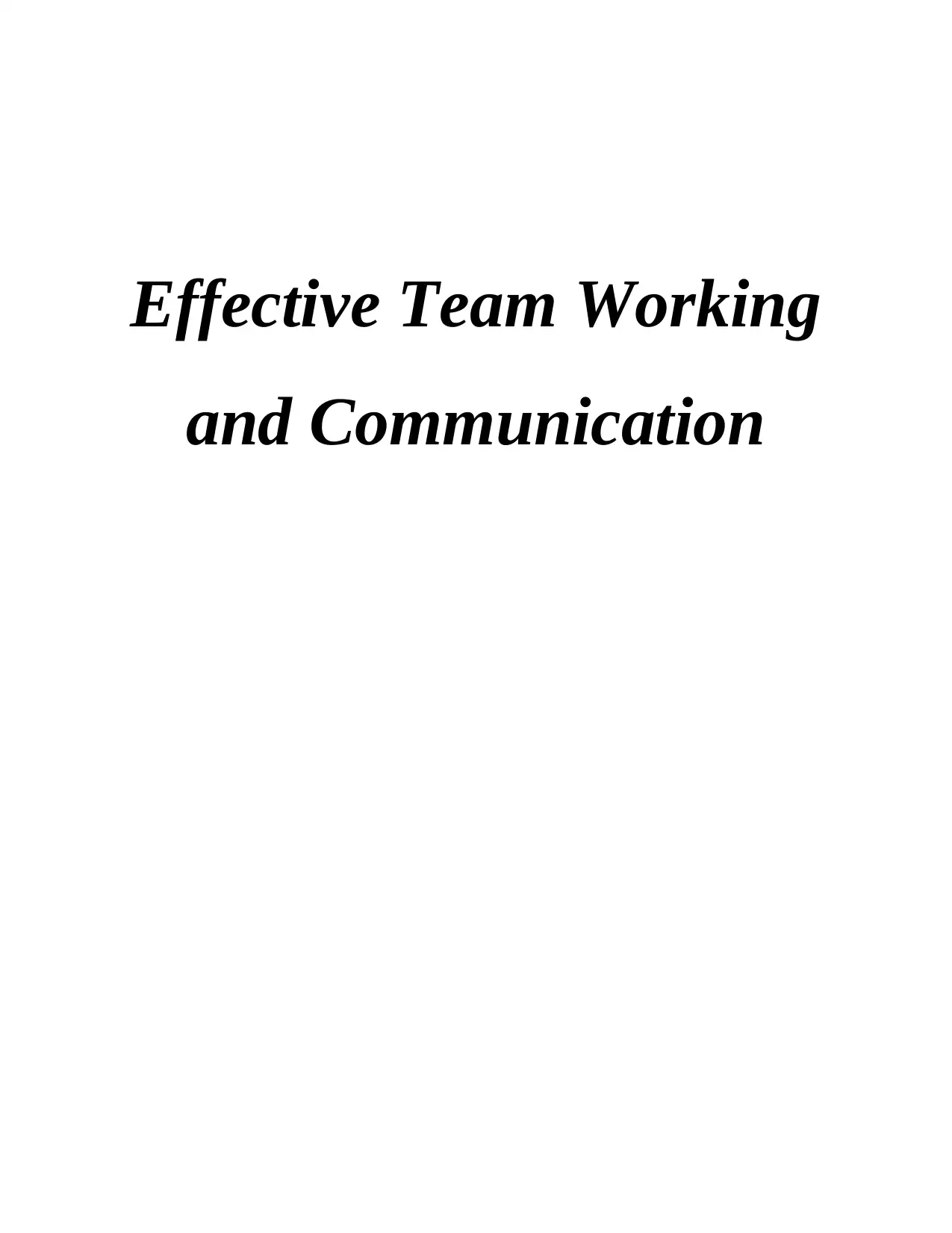
Effective Team Working
and Communication
and Communication
Paraphrase This Document
Need a fresh take? Get an instant paraphrase of this document with our AI Paraphraser
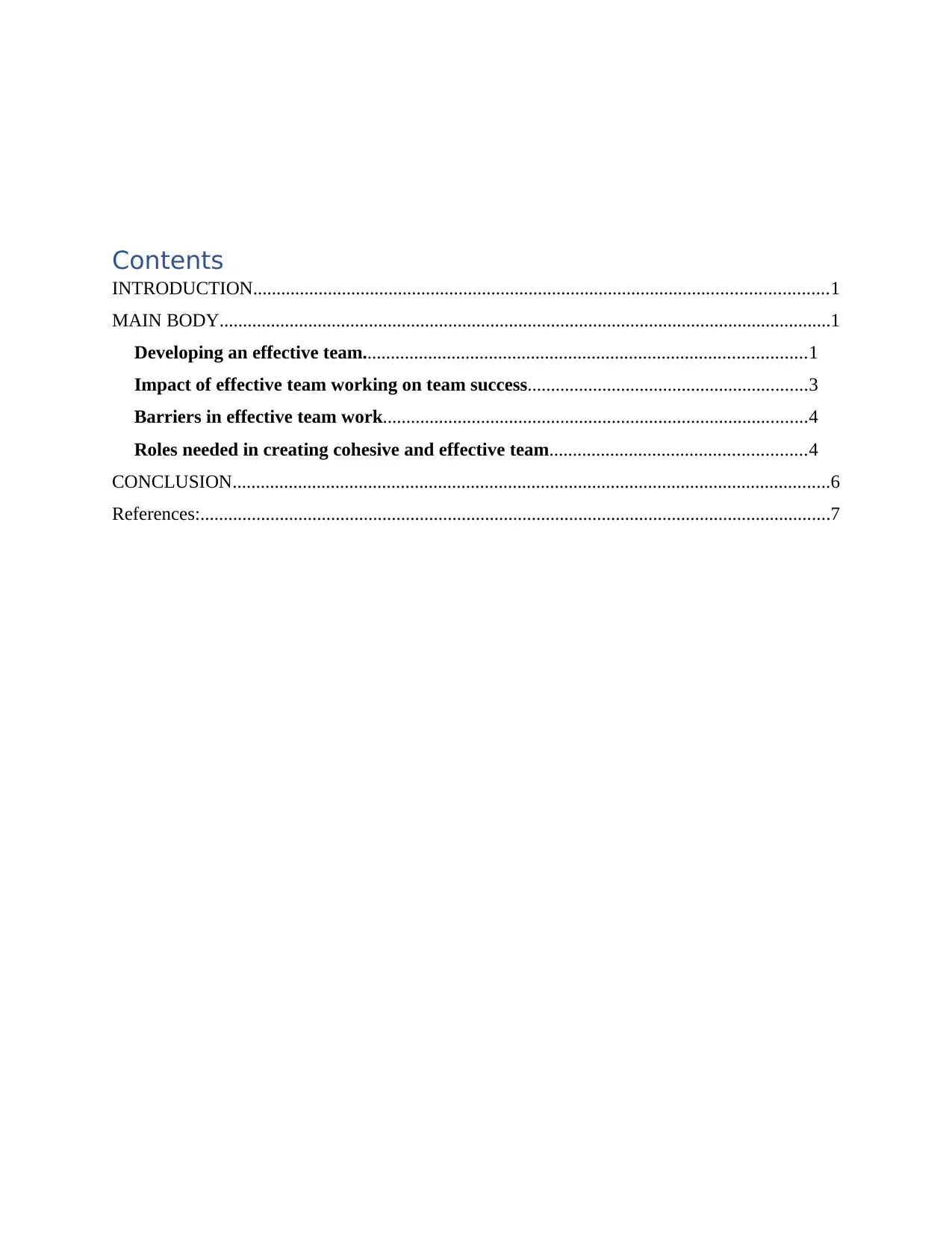
Contents
INTRODUCTION...........................................................................................................................1
MAIN BODY...................................................................................................................................1
Developing an effective team...............................................................................................1
Impact of effective team working on team success............................................................3
Barriers in effective team work...........................................................................................4
Roles needed in creating cohesive and effective team.......................................................4
CONCLUSION................................................................................................................................6
References:.......................................................................................................................................7
INTRODUCTION...........................................................................................................................1
MAIN BODY...................................................................................................................................1
Developing an effective team...............................................................................................1
Impact of effective team working on team success............................................................3
Barriers in effective team work...........................................................................................4
Roles needed in creating cohesive and effective team.......................................................4
CONCLUSION................................................................................................................................6
References:.......................................................................................................................................7
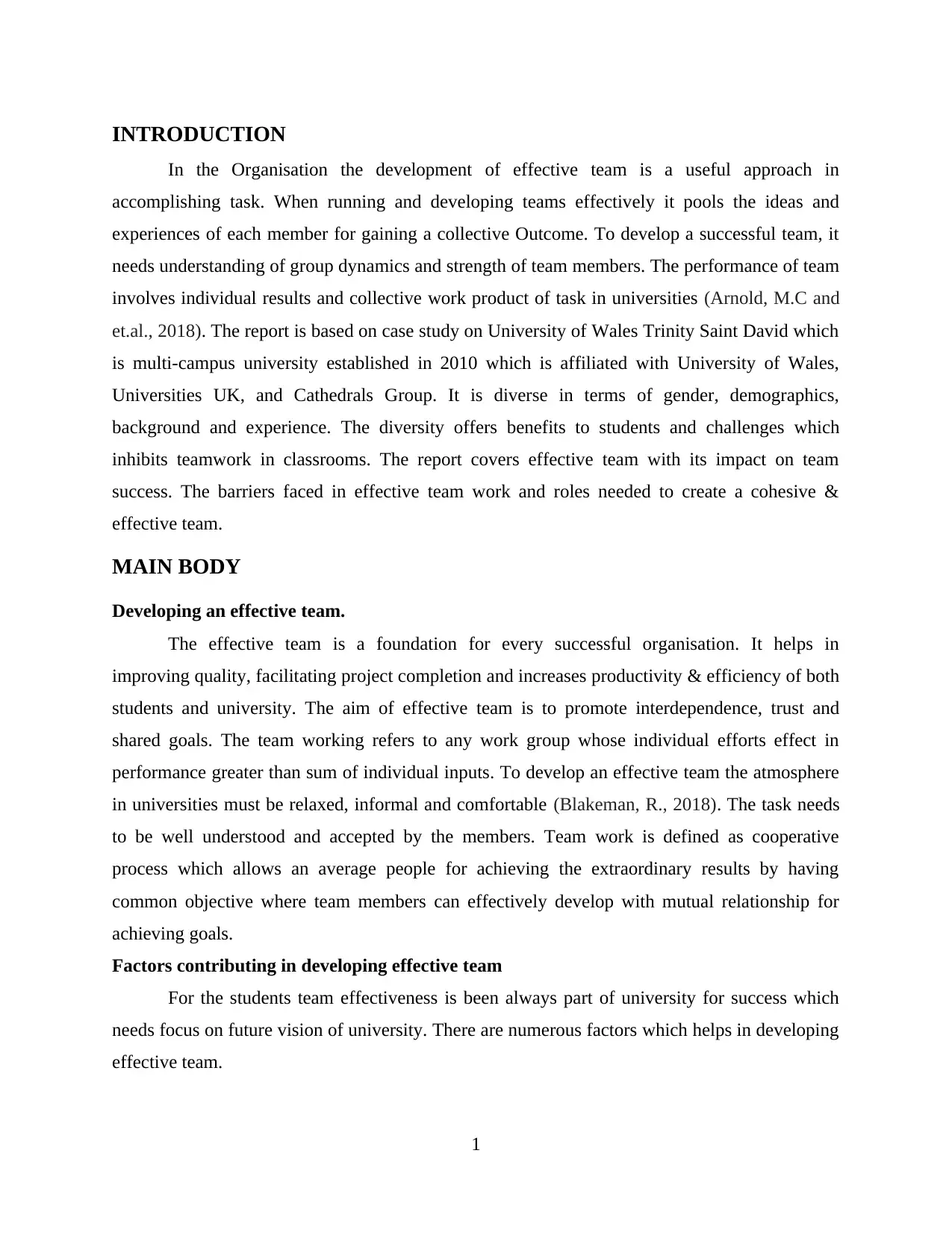
INTRODUCTION
In the Organisation the development of effective team is a useful approach in
accomplishing task. When running and developing teams effectively it pools the ideas and
experiences of each member for gaining a collective Outcome. To develop a successful team, it
needs understanding of group dynamics and strength of team members. The performance of team
involves individual results and collective work product of task in universities (Arnold, M.C and
et.al., 2018). The report is based on case study on University of Wales Trinity Saint David which
is multi-campus university established in 2010 which is affiliated with University of Wales,
Universities UK, and Cathedrals Group. It is diverse in terms of gender, demographics,
background and experience. The diversity offers benefits to students and challenges which
inhibits teamwork in classrooms. The report covers effective team with its impact on team
success. The barriers faced in effective team work and roles needed to create a cohesive &
effective team.
MAIN BODY
Developing an effective team.
The effective team is a foundation for every successful organisation. It helps in
improving quality, facilitating project completion and increases productivity & efficiency of both
students and university. The aim of effective team is to promote interdependence, trust and
shared goals. The team working refers to any work group whose individual efforts effect in
performance greater than sum of individual inputs. To develop an effective team the atmosphere
in universities must be relaxed, informal and comfortable (Blakeman, R., 2018). The task needs
to be well understood and accepted by the members. Team work is defined as cooperative
process which allows an average people for achieving the extraordinary results by having
common objective where team members can effectively develop with mutual relationship for
achieving goals.
Factors contributing in developing effective team
For the students team effectiveness is been always part of university for success which
needs focus on future vision of university. There are numerous factors which helps in developing
effective team.
1
In the Organisation the development of effective team is a useful approach in
accomplishing task. When running and developing teams effectively it pools the ideas and
experiences of each member for gaining a collective Outcome. To develop a successful team, it
needs understanding of group dynamics and strength of team members. The performance of team
involves individual results and collective work product of task in universities (Arnold, M.C and
et.al., 2018). The report is based on case study on University of Wales Trinity Saint David which
is multi-campus university established in 2010 which is affiliated with University of Wales,
Universities UK, and Cathedrals Group. It is diverse in terms of gender, demographics,
background and experience. The diversity offers benefits to students and challenges which
inhibits teamwork in classrooms. The report covers effective team with its impact on team
success. The barriers faced in effective team work and roles needed to create a cohesive &
effective team.
MAIN BODY
Developing an effective team.
The effective team is a foundation for every successful organisation. It helps in
improving quality, facilitating project completion and increases productivity & efficiency of both
students and university. The aim of effective team is to promote interdependence, trust and
shared goals. The team working refers to any work group whose individual efforts effect in
performance greater than sum of individual inputs. To develop an effective team the atmosphere
in universities must be relaxed, informal and comfortable (Blakeman, R., 2018). The task needs
to be well understood and accepted by the members. Team work is defined as cooperative
process which allows an average people for achieving the extraordinary results by having
common objective where team members can effectively develop with mutual relationship for
achieving goals.
Factors contributing in developing effective team
For the students team effectiveness is been always part of university for success which
needs focus on future vision of university. There are numerous factors which helps in developing
effective team.
1
⊘ This is a preview!⊘
Do you want full access?
Subscribe today to unlock all pages.

Trusted by 1+ million students worldwide
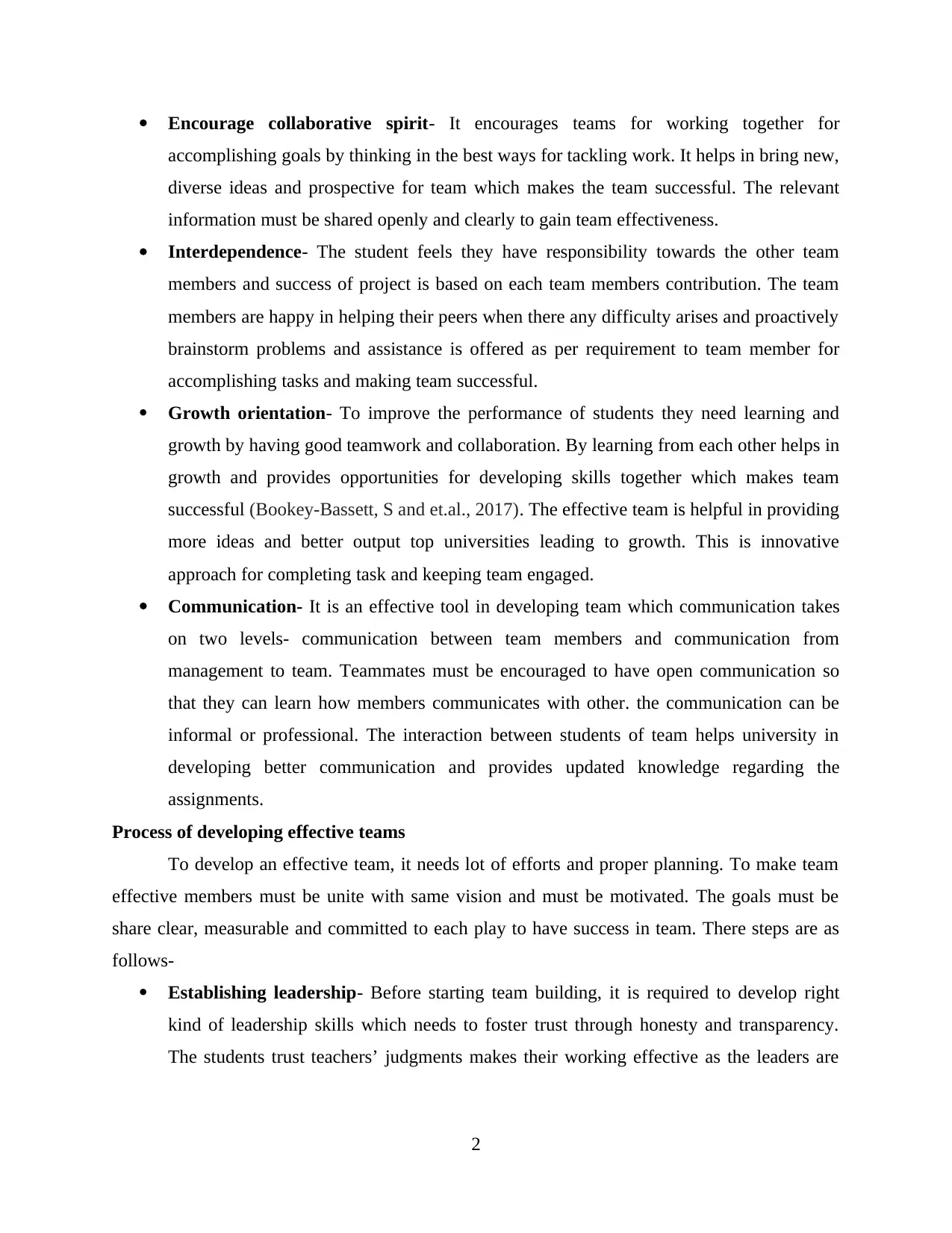
Encourage collaborative spirit- It encourages teams for working together for
accomplishing goals by thinking in the best ways for tackling work. It helps in bring new,
diverse ideas and prospective for team which makes the team successful. The relevant
information must be shared openly and clearly to gain team effectiveness.
Interdependence- The student feels they have responsibility towards the other team
members and success of project is based on each team members contribution. The team
members are happy in helping their peers when there any difficulty arises and proactively
brainstorm problems and assistance is offered as per requirement to team member for
accomplishing tasks and making team successful.
Growth orientation- To improve the performance of students they need learning and
growth by having good teamwork and collaboration. By learning from each other helps in
growth and provides opportunities for developing skills together which makes team
successful (Bookey‐Bassett, S and et.al., 2017). The effective team is helpful in providing
more ideas and better output top universities leading to growth. This is innovative
approach for completing task and keeping team engaged.
Communication- It is an effective tool in developing team which communication takes
on two levels- communication between team members and communication from
management to team. Teammates must be encouraged to have open communication so
that they can learn how members communicates with other. the communication can be
informal or professional. The interaction between students of team helps university in
developing better communication and provides updated knowledge regarding the
assignments.
Process of developing effective teams
To develop an effective team, it needs lot of efforts and proper planning. To make team
effective members must be unite with same vision and must be motivated. The goals must be
share clear, measurable and committed to each play to have success in team. There steps are as
follows-
Establishing leadership- Before starting team building, it is required to develop right
kind of leadership skills which needs to foster trust through honesty and transparency.
The students trust teachers’ judgments makes their working effective as the leaders are
2
accomplishing goals by thinking in the best ways for tackling work. It helps in bring new,
diverse ideas and prospective for team which makes the team successful. The relevant
information must be shared openly and clearly to gain team effectiveness.
Interdependence- The student feels they have responsibility towards the other team
members and success of project is based on each team members contribution. The team
members are happy in helping their peers when there any difficulty arises and proactively
brainstorm problems and assistance is offered as per requirement to team member for
accomplishing tasks and making team successful.
Growth orientation- To improve the performance of students they need learning and
growth by having good teamwork and collaboration. By learning from each other helps in
growth and provides opportunities for developing skills together which makes team
successful (Bookey‐Bassett, S and et.al., 2017). The effective team is helpful in providing
more ideas and better output top universities leading to growth. This is innovative
approach for completing task and keeping team engaged.
Communication- It is an effective tool in developing team which communication takes
on two levels- communication between team members and communication from
management to team. Teammates must be encouraged to have open communication so
that they can learn how members communicates with other. the communication can be
informal or professional. The interaction between students of team helps university in
developing better communication and provides updated knowledge regarding the
assignments.
Process of developing effective teams
To develop an effective team, it needs lot of efforts and proper planning. To make team
effective members must be unite with same vision and must be motivated. The goals must be
share clear, measurable and committed to each play to have success in team. There steps are as
follows-
Establishing leadership- Before starting team building, it is required to develop right
kind of leadership skills which needs to foster trust through honesty and transparency.
The students trust teachers’ judgments makes their working effective as the leaders are
2
Paraphrase This Document
Need a fresh take? Get an instant paraphrase of this document with our AI Paraphraser
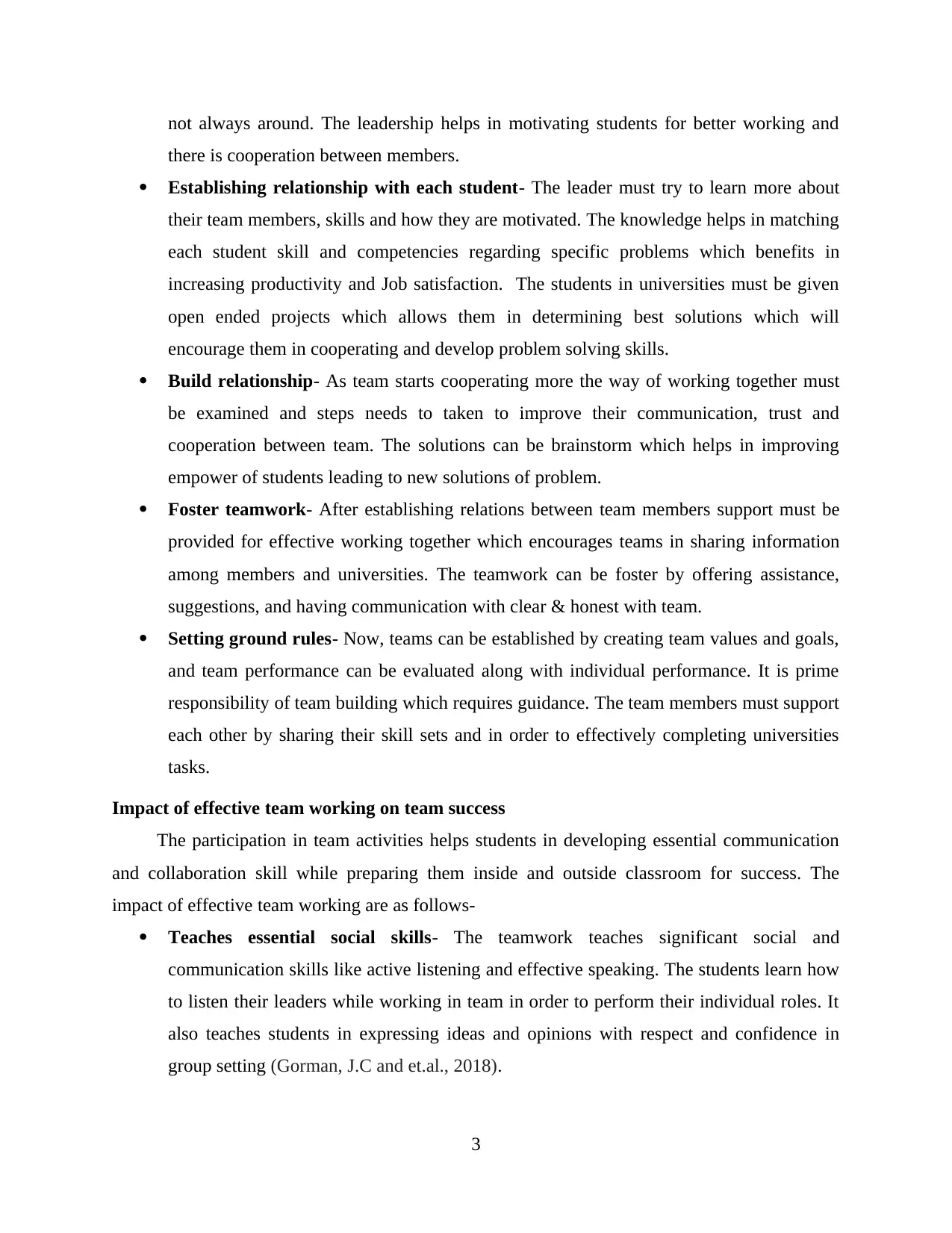
not always around. The leadership helps in motivating students for better working and
there is cooperation between members.
Establishing relationship with each student- The leader must try to learn more about
their team members, skills and how they are motivated. The knowledge helps in matching
each student skill and competencies regarding specific problems which benefits in
increasing productivity and Job satisfaction. The students in universities must be given
open ended projects which allows them in determining best solutions which will
encourage them in cooperating and develop problem solving skills.
Build relationship- As team starts cooperating more the way of working together must
be examined and steps needs to taken to improve their communication, trust and
cooperation between team. The solutions can be brainstorm which helps in improving
empower of students leading to new solutions of problem.
Foster teamwork- After establishing relations between team members support must be
provided for effective working together which encourages teams in sharing information
among members and universities. The teamwork can be foster by offering assistance,
suggestions, and having communication with clear & honest with team.
Setting ground rules- Now, teams can be established by creating team values and goals,
and team performance can be evaluated along with individual performance. It is prime
responsibility of team building which requires guidance. The team members must support
each other by sharing their skill sets and in order to effectively completing universities
tasks.
Impact of effective team working on team success
The participation in team activities helps students in developing essential communication
and collaboration skill while preparing them inside and outside classroom for success. The
impact of effective team working are as follows-
Teaches essential social skills- The teamwork teaches significant social and
communication skills like active listening and effective speaking. The students learn how
to listen their leaders while working in team in order to perform their individual roles. It
also teaches students in expressing ideas and opinions with respect and confidence in
group setting (Gorman, J.C and et.al., 2018).
3
there is cooperation between members.
Establishing relationship with each student- The leader must try to learn more about
their team members, skills and how they are motivated. The knowledge helps in matching
each student skill and competencies regarding specific problems which benefits in
increasing productivity and Job satisfaction. The students in universities must be given
open ended projects which allows them in determining best solutions which will
encourage them in cooperating and develop problem solving skills.
Build relationship- As team starts cooperating more the way of working together must
be examined and steps needs to taken to improve their communication, trust and
cooperation between team. The solutions can be brainstorm which helps in improving
empower of students leading to new solutions of problem.
Foster teamwork- After establishing relations between team members support must be
provided for effective working together which encourages teams in sharing information
among members and universities. The teamwork can be foster by offering assistance,
suggestions, and having communication with clear & honest with team.
Setting ground rules- Now, teams can be established by creating team values and goals,
and team performance can be evaluated along with individual performance. It is prime
responsibility of team building which requires guidance. The team members must support
each other by sharing their skill sets and in order to effectively completing universities
tasks.
Impact of effective team working on team success
The participation in team activities helps students in developing essential communication
and collaboration skill while preparing them inside and outside classroom for success. The
impact of effective team working are as follows-
Teaches essential social skills- The teamwork teaches significant social and
communication skills like active listening and effective speaking. The students learn how
to listen their leaders while working in team in order to perform their individual roles. It
also teaches students in expressing ideas and opinions with respect and confidence in
group setting (Gorman, J.C and et.al., 2018).
3
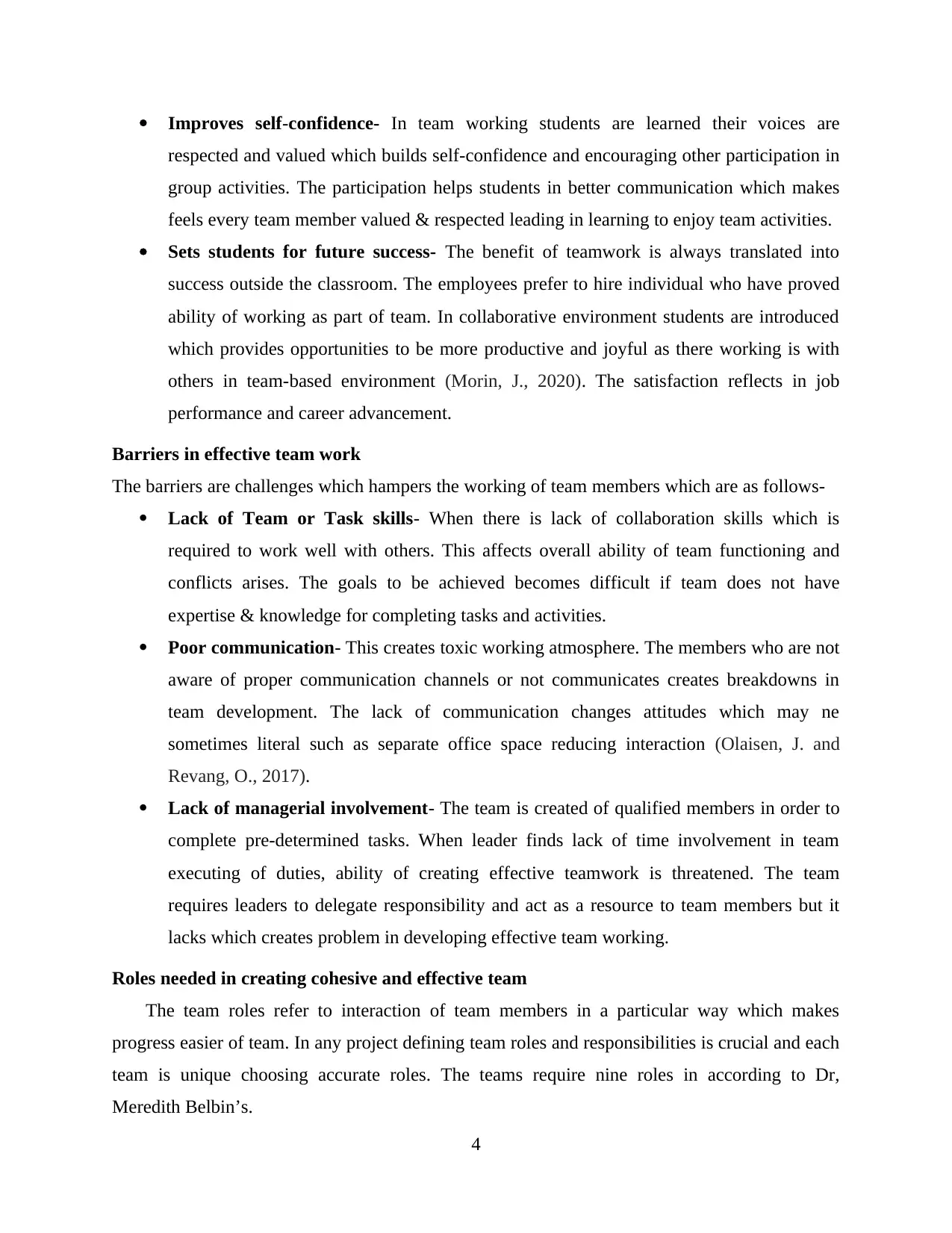
Improves self-confidence- In team working students are learned their voices are
respected and valued which builds self-confidence and encouraging other participation in
group activities. The participation helps students in better communication which makes
feels every team member valued & respected leading in learning to enjoy team activities.
Sets students for future success- The benefit of teamwork is always translated into
success outside the classroom. The employees prefer to hire individual who have proved
ability of working as part of team. In collaborative environment students are introduced
which provides opportunities to be more productive and joyful as there working is with
others in team-based environment (Morin, J., 2020). The satisfaction reflects in job
performance and career advancement.
Barriers in effective team work
The barriers are challenges which hampers the working of team members which are as follows-
Lack of Team or Task skills- When there is lack of collaboration skills which is
required to work well with others. This affects overall ability of team functioning and
conflicts arises. The goals to be achieved becomes difficult if team does not have
expertise & knowledge for completing tasks and activities.
Poor communication- This creates toxic working atmosphere. The members who are not
aware of proper communication channels or not communicates creates breakdowns in
team development. The lack of communication changes attitudes which may ne
sometimes literal such as separate office space reducing interaction (Olaisen, J. and
Revang, O., 2017).
Lack of managerial involvement- The team is created of qualified members in order to
complete pre-determined tasks. When leader finds lack of time involvement in team
executing of duties, ability of creating effective teamwork is threatened. The team
requires leaders to delegate responsibility and act as a resource to team members but it
lacks which creates problem in developing effective team working.
Roles needed in creating cohesive and effective team
The team roles refer to interaction of team members in a particular way which makes
progress easier of team. In any project defining team roles and responsibilities is crucial and each
team is unique choosing accurate roles. The teams require nine roles in according to Dr,
Meredith Belbin’s.
4
respected and valued which builds self-confidence and encouraging other participation in
group activities. The participation helps students in better communication which makes
feels every team member valued & respected leading in learning to enjoy team activities.
Sets students for future success- The benefit of teamwork is always translated into
success outside the classroom. The employees prefer to hire individual who have proved
ability of working as part of team. In collaborative environment students are introduced
which provides opportunities to be more productive and joyful as there working is with
others in team-based environment (Morin, J., 2020). The satisfaction reflects in job
performance and career advancement.
Barriers in effective team work
The barriers are challenges which hampers the working of team members which are as follows-
Lack of Team or Task skills- When there is lack of collaboration skills which is
required to work well with others. This affects overall ability of team functioning and
conflicts arises. The goals to be achieved becomes difficult if team does not have
expertise & knowledge for completing tasks and activities.
Poor communication- This creates toxic working atmosphere. The members who are not
aware of proper communication channels or not communicates creates breakdowns in
team development. The lack of communication changes attitudes which may ne
sometimes literal such as separate office space reducing interaction (Olaisen, J. and
Revang, O., 2017).
Lack of managerial involvement- The team is created of qualified members in order to
complete pre-determined tasks. When leader finds lack of time involvement in team
executing of duties, ability of creating effective teamwork is threatened. The team
requires leaders to delegate responsibility and act as a resource to team members but it
lacks which creates problem in developing effective team working.
Roles needed in creating cohesive and effective team
The team roles refer to interaction of team members in a particular way which makes
progress easier of team. In any project defining team roles and responsibilities is crucial and each
team is unique choosing accurate roles. The teams require nine roles in according to Dr,
Meredith Belbin’s.
4
⊘ This is a preview!⊘
Do you want full access?
Subscribe today to unlock all pages.

Trusted by 1+ million students worldwide
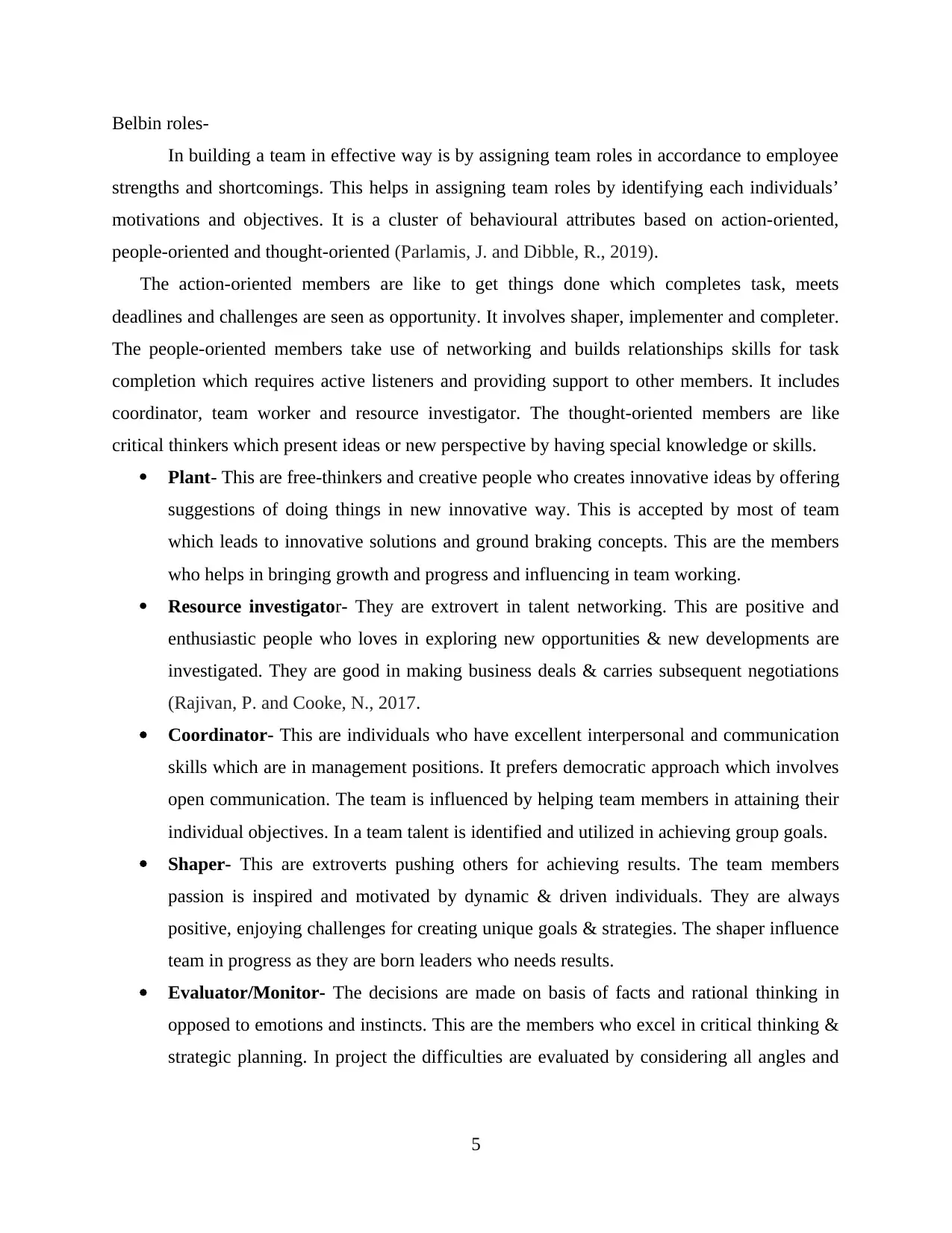
Belbin roles-
In building a team in effective way is by assigning team roles in accordance to employee
strengths and shortcomings. This helps in assigning team roles by identifying each individuals’
motivations and objectives. It is a cluster of behavioural attributes based on action-oriented,
people-oriented and thought-oriented (Parlamis, J. and Dibble, R., 2019).
The action-oriented members are like to get things done which completes task, meets
deadlines and challenges are seen as opportunity. It involves shaper, implementer and completer.
The people-oriented members take use of networking and builds relationships skills for task
completion which requires active listeners and providing support to other members. It includes
coordinator, team worker and resource investigator. The thought-oriented members are like
critical thinkers which present ideas or new perspective by having special knowledge or skills.
Plant- This are free-thinkers and creative people who creates innovative ideas by offering
suggestions of doing things in new innovative way. This is accepted by most of team
which leads to innovative solutions and ground braking concepts. This are the members
who helps in bringing growth and progress and influencing in team working.
Resource investigator- They are extrovert in talent networking. This are positive and
enthusiastic people who loves in exploring new opportunities & new developments are
investigated. They are good in making business deals & carries subsequent negotiations
(Rajivan, P. and Cooke, N., 2017.
Coordinator- This are individuals who have excellent interpersonal and communication
skills which are in management positions. It prefers democratic approach which involves
open communication. The team is influenced by helping team members in attaining their
individual objectives. In a team talent is identified and utilized in achieving group goals.
Shaper- This are extroverts pushing others for achieving results. The team members
passion is inspired and motivated by dynamic & driven individuals. They are always
positive, enjoying challenges for creating unique goals & strategies. The shaper influence
team in progress as they are born leaders who needs results.
Evaluator/Monitor- The decisions are made on basis of facts and rational thinking in
opposed to emotions and instincts. This are the members who excel in critical thinking &
strategic planning. In project the difficulties are evaluated by considering all angles and
5
In building a team in effective way is by assigning team roles in accordance to employee
strengths and shortcomings. This helps in assigning team roles by identifying each individuals’
motivations and objectives. It is a cluster of behavioural attributes based on action-oriented,
people-oriented and thought-oriented (Parlamis, J. and Dibble, R., 2019).
The action-oriented members are like to get things done which completes task, meets
deadlines and challenges are seen as opportunity. It involves shaper, implementer and completer.
The people-oriented members take use of networking and builds relationships skills for task
completion which requires active listeners and providing support to other members. It includes
coordinator, team worker and resource investigator. The thought-oriented members are like
critical thinkers which present ideas or new perspective by having special knowledge or skills.
Plant- This are free-thinkers and creative people who creates innovative ideas by offering
suggestions of doing things in new innovative way. This is accepted by most of team
which leads to innovative solutions and ground braking concepts. This are the members
who helps in bringing growth and progress and influencing in team working.
Resource investigator- They are extrovert in talent networking. This are positive and
enthusiastic people who loves in exploring new opportunities & new developments are
investigated. They are good in making business deals & carries subsequent negotiations
(Rajivan, P. and Cooke, N., 2017.
Coordinator- This are individuals who have excellent interpersonal and communication
skills which are in management positions. It prefers democratic approach which involves
open communication. The team is influenced by helping team members in attaining their
individual objectives. In a team talent is identified and utilized in achieving group goals.
Shaper- This are extroverts pushing others for achieving results. The team members
passion is inspired and motivated by dynamic & driven individuals. They are always
positive, enjoying challenges for creating unique goals & strategies. The shaper influence
team in progress as they are born leaders who needs results.
Evaluator/Monitor- The decisions are made on basis of facts and rational thinking in
opposed to emotions and instincts. This are the members who excel in critical thinking &
strategic planning. In project the difficulties are evaluated by considering all angles and
5
Paraphrase This Document
Need a fresh take? Get an instant paraphrase of this document with our AI Paraphraser
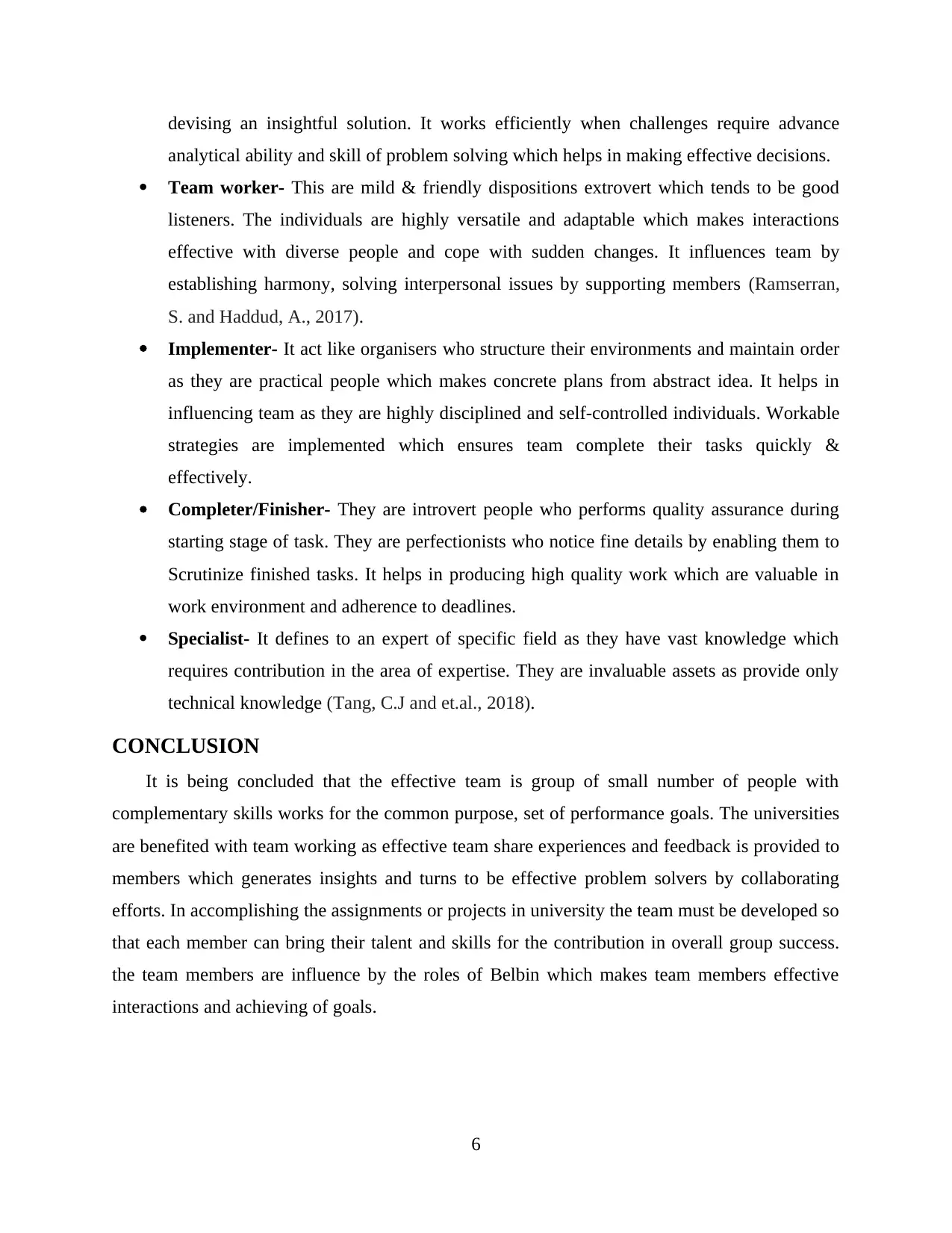
devising an insightful solution. It works efficiently when challenges require advance
analytical ability and skill of problem solving which helps in making effective decisions.
Team worker- This are mild & friendly dispositions extrovert which tends to be good
listeners. The individuals are highly versatile and adaptable which makes interactions
effective with diverse people and cope with sudden changes. It influences team by
establishing harmony, solving interpersonal issues by supporting members (Ramserran,
S. and Haddud, A., 2017).
Implementer- It act like organisers who structure their environments and maintain order
as they are practical people which makes concrete plans from abstract idea. It helps in
influencing team as they are highly disciplined and self-controlled individuals. Workable
strategies are implemented which ensures team complete their tasks quickly &
effectively.
Completer/Finisher- They are introvert people who performs quality assurance during
starting stage of task. They are perfectionists who notice fine details by enabling them to
Scrutinize finished tasks. It helps in producing high quality work which are valuable in
work environment and adherence to deadlines.
Specialist- It defines to an expert of specific field as they have vast knowledge which
requires contribution in the area of expertise. They are invaluable assets as provide only
technical knowledge (Tang, C.J and et.al., 2018).
CONCLUSION
It is being concluded that the effective team is group of small number of people with
complementary skills works for the common purpose, set of performance goals. The universities
are benefited with team working as effective team share experiences and feedback is provided to
members which generates insights and turns to be effective problem solvers by collaborating
efforts. In accomplishing the assignments or projects in university the team must be developed so
that each member can bring their talent and skills for the contribution in overall group success.
the team members are influence by the roles of Belbin which makes team members effective
interactions and achieving of goals.
6
analytical ability and skill of problem solving which helps in making effective decisions.
Team worker- This are mild & friendly dispositions extrovert which tends to be good
listeners. The individuals are highly versatile and adaptable which makes interactions
effective with diverse people and cope with sudden changes. It influences team by
establishing harmony, solving interpersonal issues by supporting members (Ramserran,
S. and Haddud, A., 2017).
Implementer- It act like organisers who structure their environments and maintain order
as they are practical people which makes concrete plans from abstract idea. It helps in
influencing team as they are highly disciplined and self-controlled individuals. Workable
strategies are implemented which ensures team complete their tasks quickly &
effectively.
Completer/Finisher- They are introvert people who performs quality assurance during
starting stage of task. They are perfectionists who notice fine details by enabling them to
Scrutinize finished tasks. It helps in producing high quality work which are valuable in
work environment and adherence to deadlines.
Specialist- It defines to an expert of specific field as they have vast knowledge which
requires contribution in the area of expertise. They are invaluable assets as provide only
technical knowledge (Tang, C.J and et.al., 2018).
CONCLUSION
It is being concluded that the effective team is group of small number of people with
complementary skills works for the common purpose, set of performance goals. The universities
are benefited with team working as effective team share experiences and feedback is provided to
members which generates insights and turns to be effective problem solvers by collaborating
efforts. In accomplishing the assignments or projects in university the team must be developed so
that each member can bring their talent and skills for the contribution in overall group success.
the team members are influence by the roles of Belbin which makes team members effective
interactions and achieving of goals.
6
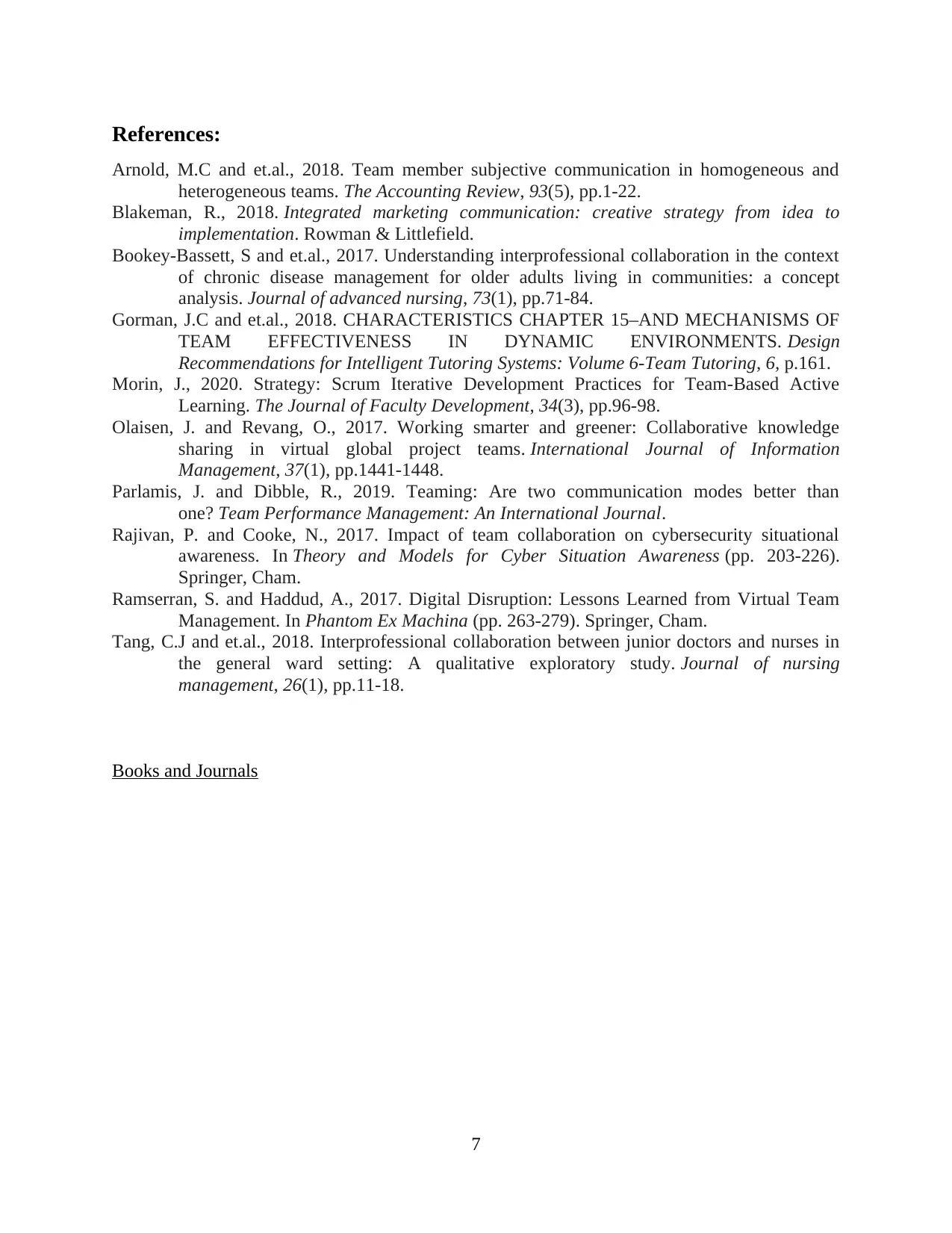
References:
Arnold, M.C and et.al., 2018. Team member subjective communication in homogeneous and
heterogeneous teams. The Accounting Review, 93(5), pp.1-22.
Blakeman, R., 2018. Integrated marketing communication: creative strategy from idea to
implementation. Rowman & Littlefield.
Bookey‐Bassett, S and et.al., 2017. Understanding interprofessional collaboration in the context
of chronic disease management for older adults living in communities: a concept
analysis. Journal of advanced nursing, 73(1), pp.71-84.
Gorman, J.C and et.al., 2018. CHARACTERISTICS CHAPTER 15–AND MECHANISMS OF
TEAM EFFECTIVENESS IN DYNAMIC ENVIRONMENTS. Design
Recommendations for Intelligent Tutoring Systems: Volume 6-Team Tutoring, 6, p.161.
Morin, J., 2020. Strategy: Scrum Iterative Development Practices for Team-Based Active
Learning. The Journal of Faculty Development, 34(3), pp.96-98.
Olaisen, J. and Revang, O., 2017. Working smarter and greener: Collaborative knowledge
sharing in virtual global project teams. International Journal of Information
Management, 37(1), pp.1441-1448.
Parlamis, J. and Dibble, R., 2019. Teaming: Are two communication modes better than
one? Team Performance Management: An International Journal.
Rajivan, P. and Cooke, N., 2017. Impact of team collaboration on cybersecurity situational
awareness. In Theory and Models for Cyber Situation Awareness (pp. 203-226).
Springer, Cham.
Ramserran, S. and Haddud, A., 2017. Digital Disruption: Lessons Learned from Virtual Team
Management. In Phantom Ex Machina (pp. 263-279). Springer, Cham.
Tang, C.J and et.al., 2018. Interprofessional collaboration between junior doctors and nurses in
the general ward setting: A qualitative exploratory study. Journal of nursing
management, 26(1), pp.11-18.
Books and Journals
7
Arnold, M.C and et.al., 2018. Team member subjective communication in homogeneous and
heterogeneous teams. The Accounting Review, 93(5), pp.1-22.
Blakeman, R., 2018. Integrated marketing communication: creative strategy from idea to
implementation. Rowman & Littlefield.
Bookey‐Bassett, S and et.al., 2017. Understanding interprofessional collaboration in the context
of chronic disease management for older adults living in communities: a concept
analysis. Journal of advanced nursing, 73(1), pp.71-84.
Gorman, J.C and et.al., 2018. CHARACTERISTICS CHAPTER 15–AND MECHANISMS OF
TEAM EFFECTIVENESS IN DYNAMIC ENVIRONMENTS. Design
Recommendations for Intelligent Tutoring Systems: Volume 6-Team Tutoring, 6, p.161.
Morin, J., 2020. Strategy: Scrum Iterative Development Practices for Team-Based Active
Learning. The Journal of Faculty Development, 34(3), pp.96-98.
Olaisen, J. and Revang, O., 2017. Working smarter and greener: Collaborative knowledge
sharing in virtual global project teams. International Journal of Information
Management, 37(1), pp.1441-1448.
Parlamis, J. and Dibble, R., 2019. Teaming: Are two communication modes better than
one? Team Performance Management: An International Journal.
Rajivan, P. and Cooke, N., 2017. Impact of team collaboration on cybersecurity situational
awareness. In Theory and Models for Cyber Situation Awareness (pp. 203-226).
Springer, Cham.
Ramserran, S. and Haddud, A., 2017. Digital Disruption: Lessons Learned from Virtual Team
Management. In Phantom Ex Machina (pp. 263-279). Springer, Cham.
Tang, C.J and et.al., 2018. Interprofessional collaboration between junior doctors and nurses in
the general ward setting: A qualitative exploratory study. Journal of nursing
management, 26(1), pp.11-18.
Books and Journals
7
⊘ This is a preview!⊘
Do you want full access?
Subscribe today to unlock all pages.

Trusted by 1+ million students worldwide
1 out of 9
Related Documents
Your All-in-One AI-Powered Toolkit for Academic Success.
+13062052269
info@desklib.com
Available 24*7 on WhatsApp / Email
![[object Object]](/_next/static/media/star-bottom.7253800d.svg)
Unlock your academic potential
Copyright © 2020–2026 A2Z Services. All Rights Reserved. Developed and managed by ZUCOL.




